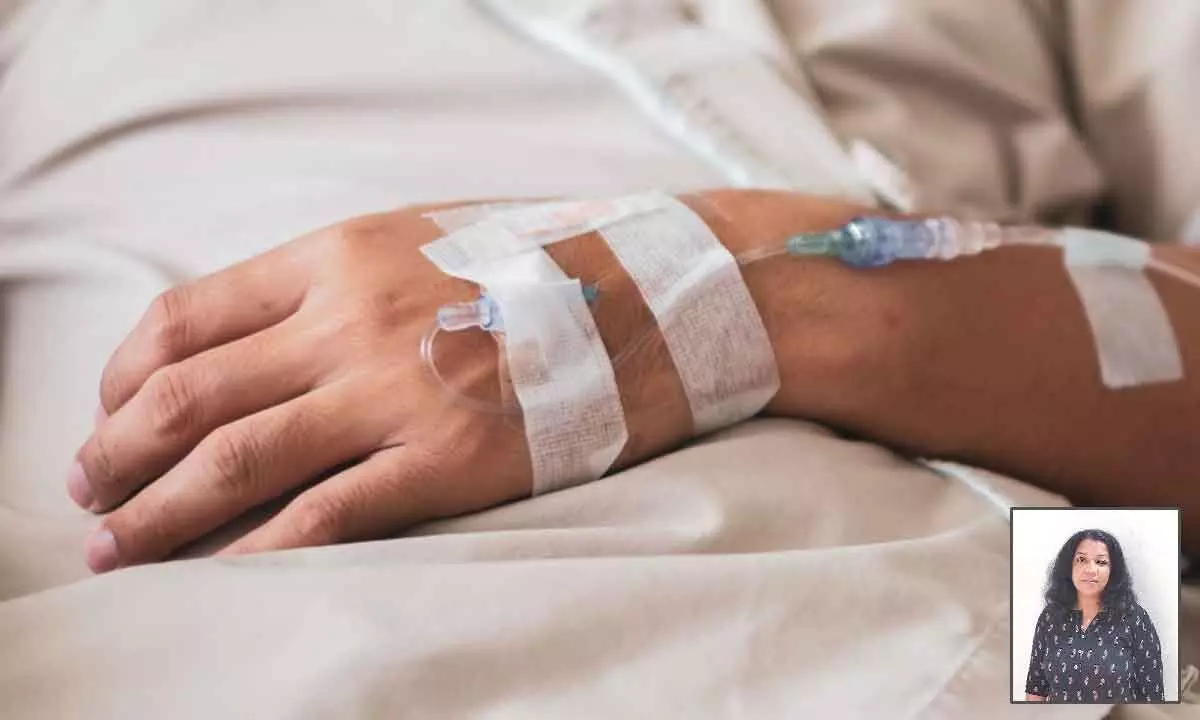Parliamentary committee urges govt to make cancer treatment affordable
Recommends the govt to regulate the prices of services such as radio therapy, under the provisions of the Essential Commodities Act in line with the regulations on the drug prices
image for illustrative purpose

To make cancer treatment affordable to the common people in the country, the Department-related Parliamentary Standing Committee on Health and Family Welfare has recently recommended to the central government to regulate the prices of services such as radio therapy, under the provisions of the Essential Commodities Act in line with the regulations on the drug prices. The committee has also recommended to the government to look at group negotiation for cancer drugs, equipment and consumables to bring down the cost of cancer treatment in the country.
In its 139th report on 'Cancer Care Plan & Management: Prevention, Diagnosis, Research & Affordability of Cancer Treatment', the committee, under the chairmanship of Member of Parliament Prof. Ram Gopal Yadav, noted that the cost of cancer treatment is not only the price of medicines, but the cost of healthcare for any patient in the country includes a variety of charges such as doctor consultation and nursing fee, room charge, pathological and maintenance charges thereby increasing the overall cost of the treatment.
It is true that the government is providing subsidised food and heavily subsidised power. But, inaccessible and increasing cost of cancer treatment is still a matter of grave concern as not only the patient but the whole family of the patient undergoes tremendous psychological and economic pressure in bearing the cost of the treatment and sailing through troubled phase of life.
It is under this backdrop the Parliamentary Committee has considered it pertinent, on the part of the government, to take suitable measurers not only for regulation of medicines having focus on reducing the cost of the medicine but also to provide subsidised healthcare by regulating the cost of diagnostic and treatment kits and service charges for various components of healthcare rendered not only in government hospitals but also in the private hospitals. For instance, the high cost of radio therapy is resulting in unaffordable cancer treatment.
In the country, the National Pharmaceutical Pricing Authority (NPPA) is mandated only to control drug prices through drug price control order (DPCO) and not the service charges because radio therapy service has not been declared an essential commodity or service either under the Essential Commodities Act, 1955 or under the National List of Essential Medicine (NLEM). In September last year, the central government had released the NLEM 2021, adding 39 drugs including anti-cancer, anti-diabetes and antiretroviral drugs to the list. It has also deleted 16 drugs from the NLEM 2015, including erythromycin and a combination of lamivudine.
The new drugs added to the NLEM 2021 list included Amikacin (antibiotic), Azacitidine (anti-cancer), Bedaquiline (anti-TB), Bendamustine Hydrochloride (anti-cancer), Buprenorphine (opioid to treat opioid use disorder), Buprenorphine (A)+ Naloxone (B) (to treat opioid addiction), Cefuroxime (antibiotic), Dabigatran (anticoagulant), Daclatasvir (hepatitis C drug), Darunavir (A) + Ritonavir (B) (antiretroviral), Delamanid (anti-TB), Dolutegravir (antiretroviral), Fludarabine (anti-cancer), Fludrocortisone (corticosteroid), Fomepizole (antidote to certain poisoning), Fulvestrant (anti-cancer), Insulin Glargine (long-acting insulin), Irinotecan HCI Trihydrate (anti-cancer), Itraconazole (antifungal), Ivermectin (to treat parasite infection), Lamivudine (antiretroviral), Latanoprost (ophthalmic), Lenalidomide (anti-cancer), Leuprolide acetate (anti-cancer), monelukast (asthma drug), Mupirocin (antibiotic), Nicotine replacement therapy (to treat tobacco use disorder), Nitazoxanide (anti parasitic and antiviral), Ormeloxifene [Centchroman] (nonsteroidal oral contraceptive), Phenoxymethyl Penicillin (antibiotic), Procaine Benzyl Penicillin (antibiotic), Rotavirus vaccine, Secnidazole (anti-infective), Tenecteplase (thrombolytic drug), Teneligliptin (anti-diabetic), Tenofovir + Lamivudine + Dolutegravir (antiretroviral), Tenofovir Alafenamide Fumarate [TAF] (Hepatitis B drug), Terbinafine (antifungal) and Valganciclovir (antiviral).
The Parliamentary panel noted that the anti-cancer drugs as well as equipment are very expensive and the Cancer Centers would find it difficult to negotiate competitive prices with equipment manufacturers and the pharmaceutical industry. It has also been informed that exploiting the volumes of individual cancer centres, the National Cancer Grid (NCG) has negotiated with pharmaceutical companies for high value cancer drugs. By aggregating the demand from many centres, the NCG worked on a solution wherein 'price discovery' of commonly used, high-value items are negotiated with industry, thereby passing on the benefits to member centres and onwards to patients. Using transparent policies for tendering and a web-enabled e-tendering platform, this initiative has brought down current costs of cancer care significantly (average of 55 per cent discount on MRP) while maintaining the quality of drugs.
It is clear that though some of the anti-cancer drugs have been brought under the NLEM to control the prices, the prices of services such as radio therapy are not controlled by the government making the cancer treatment still very costly in the country. After deliberating on the issue, the Parliamentary Committee has now recommended to the government to examine as to the types of healthcare services should be regulated in terms of price and therefore be made provision of the Essential Commodities Act, 1955. The Parliamentary panel has done its bit. Now, it is over to the central government to act for the interest of patient community in the country.
(The author is a freelance journalist with varied experience in different fields)

